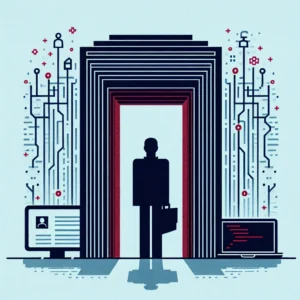Tech interviews can sometimes feel like trying to unlock a door with a set of keys you’ve never seen before. No matter how many coding challenges you complete or concepts you memorize, the unpredictable nature of these interviews can leave even the most prepared candidates feeling lost in the dark. It’s a common frustration: You’ve got the skills and the knowledge, but when it comes to showcasing them under the spotlight, something just doesn’t click.
Here’s where we bridge the gap. In this blog, we’re diving into the power of mock interviews and how they can transform your tech job preparation from uncertain to unstoppable.
Quick Takeaways:
- Mock interviews provide crucial real-world practice, improving both your technical proficiency and interview confidence.
- Immediate, actionable feedback from mock interviews identifies gaps in your skills and refines your communication.
- Emulating the real tech interview environment and recording yourself can significantly enhance your performance on the actual day.
Why are mock interviews particularly crucial in tech?
Diving into the tech world, it’s clear that the interview process has its unique set of challenges. Tech interviews often go beyond the typical resume review and behavioral questions, delving deep into technical questions, coding challenges, and problem-solving tasks. These segments are not just about finding the right answer but also demonstrating your thought process, coding efficiency, and ability to work under pressure. Mock interviews play a crucial role here; they’re not just helpful, they’re a must. They replicate the stress and timing pressure of real interviews, providing invaluable practice that can make the difference between a good and an outstanding performance on the actual day. Imagine nailing a tough algorithm question because you’d practiced a similar problem just a few days before—that’s the edge mock interviews can give you.
What can you gain from a mock interview?
Mock interviews are like secret weapons for tech job applicants. They not only sharpen your technical skills but also help polish your overall delivery. Here’s what you stand to gain:
- Immediate feedback: Whether it’s a gap in your technical knowledge or a quirk in your communication style, timely feedback can make a monumental difference.
- Enhanced confidence: Knowing you’ve faced down tough technical questions before makes the real interview less daunting.
- Insight into the interviewer’s perspective: It’s a rare chance to step into the shoes of the person on the other side of the table, understanding what they’re looking for in a candidate’s answers.
- Practice in a simulated environment: Helps ease nerves on the day of the real interview, as the setting feels familiar.
- Personal presentation refinement: How you convey your thoughts is as important as getting the right answer. Mock interviews help tune your delivery for clarity and impact.
But here’s something most folks don’t really talk about: Eliciting unexpected questions. One truly unique benefit of mock interviews, particularly when they’re conducted by experienced tech professionals, is the chance to tackle out-of-the-box questions or problems you might not have prepared for. This exposure can significantly widen your problem-solving scope, preparing you for almost anything the real interview could throw your way.
How do you simulate a real tech interview environment?
Replicating the pressure and environment of a tech interview is key to a fruitful mock interview. Here’s how to create as real an environment as possible:
-
Online platforms: Utilize platforms like Pramp or Interviewing.io, which offer free mock interviews with peers and sometimes even with professionals. These platforms can closely mimic the type of questions and the interface you’d encounter in many tech interviews.
-
Coding environments: Practice coding in an Integrated Development Environment (IDE) similar to what you’d use in the actual interview. For software engineering roles, familiarity with code execution environments is crucial. Platforms such as LeetCode and HackerRank provide a multitude of problems to practice on and get accustomed to the interface.
-
Common tech interview questions: Research and compile a list of frequent interview questions for the role you’re applying for. Websites like Glassdoor often have company-specific interview questions shared by past interviewees.
-
Time yourself: Real interviews often have strict time limits for solving problems. Use a timer to replicate this pressure, and practice articulating your thought process and solution within these constraints.
-
Simulate the interview day: For remote interviews, ensure your technology setup is sound — check your internet connection, microphone, and webcam. For in-person interviews, practice dressing the part and arriving on time, even if it’s just in another room of your home.
A tip not many think about: Record yourself during a mock session. It’s eye-opening to see yourself from the viewpoint of an interviewer. You can catch nuances in your speech, body language, and problem-solving approach that might need tweaking.
Crafting a realistic mock interview environment not only prepares you for what lies ahead but also builds confidence. This preparation ensures you can focus on showcasing your skills and personality, rather than sweating the small stuff. Remember, the goal is to make the real interview feel like just another practice session.
What are the Most Common Mistakes to Avoid in a Tech Interview?
Landing a tech job can feel like navigating a minefield. One wrong step, and boom – you’ve inadvertently showcased a weakness or missed an opportunity to impress. That’s where mock interviews earn their stripes, helping you dodge common pitfalls. Let’s unpack a few frequent missteps that even the sharpest candidates make during tech interviews:
-
Underestimating the Soft Skills : In the tech world, it’s easy to get lost in algorithms and coding challenges. However, communication, teamwork, and problem-solving are equally prized. Mock interviews can shine a spotlight on these areas, encouraging you to articulate your thought process and work collaboratively.
-
The Problem with Problem-Solving : Panicking on a complex problem or freezing up? This happens to the best. During mock interviews, you get the chance to practice thinking aloud and tackling problems systematically – a skill that’s golden in real interviews.
-
Technical Preparation Missteps : Focusing too much on one area while neglecting others is a common error. A balanced approach is key. Mock interviews help identify your weak spots, be it data structures, system design, or coding efficiency.
-
Ignoring Company Culture : Tech giants and startups are not cut from the same cloth. Understanding and articulating how you fit into a company’s culture is crucial but often overlooked. Mock interviews can provide insights into tailoring your responses to show you’re not just a technical fit but a cultural fit too.
-
The Unique Tip : Remember, it’s not just about answering questions; it’s about engaging your interviewer. Ask insightful questions at the end of your mock interviews. This practice will prepare you to turn the tables in real interviews, showing your curiosity and engagement. It’s something often missed but can set you apart from the crowd.
How Can You Get the Most Out of Your Mock Interview Feedback?
Feedback is the gold dust of mock interviews. However, not all that glitters is gold. You need to sift through it, find actionable insights, and polish your skills. Here’s how to make that feedback work for you:
-
Take It On the Chin : First off, embrace the feedback, warts and all. It’s easy to get defensive, but remember, every critique is a stepping stone to improvement.
-
Actionable Insights : Look for specific, actionable advice. Broad statements like “improve coding skills” are less helpful than “practice dynamic programming problems.” Focus on feedback that gives you a clear direction.
-
Prioritize : You can’t tackle everything at once. If you’re getting feedback on both your coding efficiency and your communication skills, decide which is more critical for the roles you’re applying for, and start there.
-
Implement and Iterate : Take one piece of feedback and work it into your next mock interview. For instance, if you’ve been told to improve your problem-solving approach, focus on talking through your thought process more clearly in your next practice session.
-
The Circle of Feedback : After implementing feedback, seek more. It’s an ongoing process. Each round of feedback should build on the last, gradually sharpening your skills and boosting your confidence.
An example worth emulating : Imagine you received feedback about not asking clarifying questions when faced with a problem. In your next mock interview, make a concerted effort to start each problem-solving process with a few targeted questions. Not only does this show your analytical approach, but it can also significantly improve how you understand and tackle problems.
Remember, mock interviews and their subsequent feedback are your sandbox. It’s where you can build, knock down, and rebuild your approach to tech interviews. Each iteration brings you closer to the developer you aspire to be—more confident, articulate, and technically adept. Dive into these practice sessions with an open mind and a willing heart. The improvements will follow, propelling you towards that coveted tech job.


